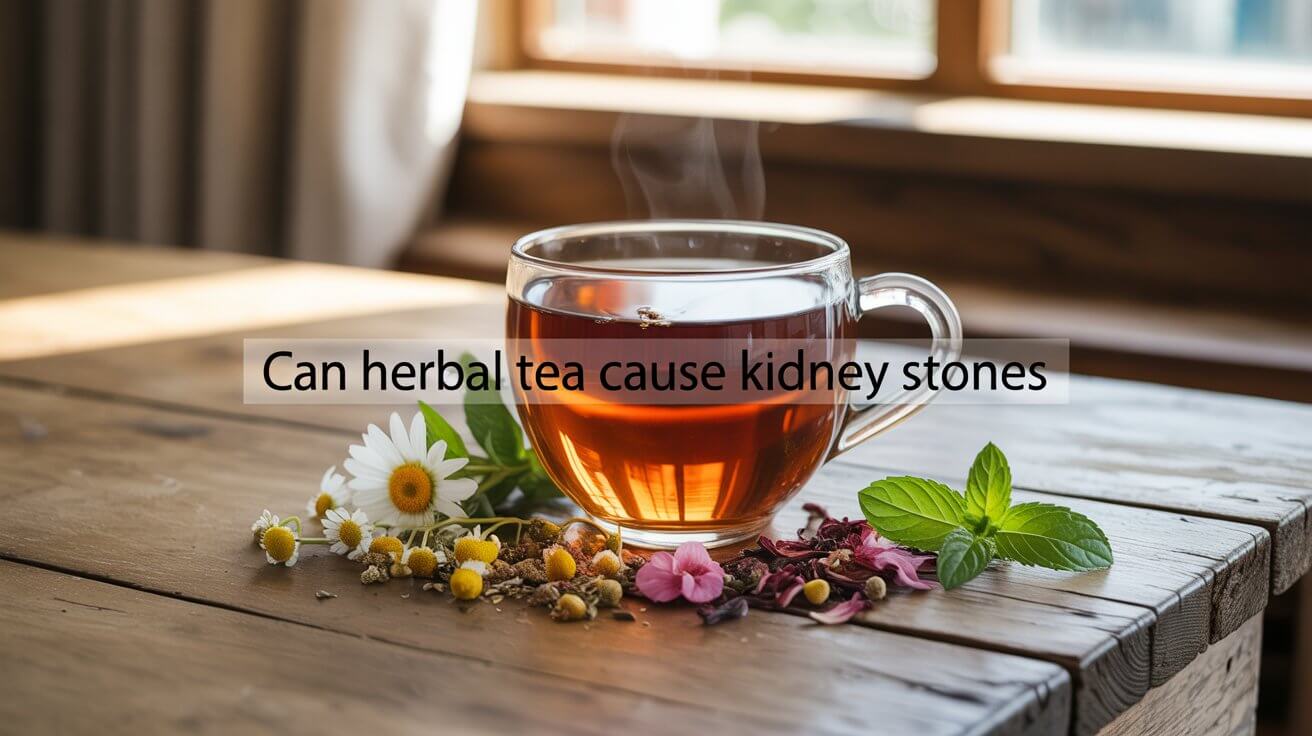Herbal tea has become a daily ritual for millions seeking calm, hydration, and health a caffeine-free comfort that feels as natural as it tastes. But as tea culture grows, so do health concerns. One trending question in 2025: Can herbal tea cause kidney stones?
While most herbal teas are perfectly safe, certain blends and habits can increase your kidney stone risk. This guide breaks down what the latest research says, which teas are safe, and how to enjoy your favorite brew without harming your kidneys.
Understanding Kidney Stones in 2025
Kidney stones are crystal-like mineral deposits that form when your urine becomes concentrated, allowing calcium, oxalate, or uric acid to bind together. These stones can range from a grain of sand to a marble-sized lump and they’re as painful as they sound.
According to a 2024 update from the National Kidney Foundation, global kidney stone cases are rising, particularly in regions with hot climates and high-salt diets. The main causes include:
-
Dehydration – Concentrated urine gives minerals more opportunity to crystallize.
-
High oxalate intake – Oxalate binds to calcium in the kidneys, forming stones.
-
Excessive sodium – High salt levels increase calcium in the urine.
-
Genetic or metabolic conditions – Some people naturally produce more stone-forming compounds.
Herbal Tea and Kidney Health: The Real Connection
Herbal teas differ from traditional teas (like green or black) because they’re made from leaves, roots, flowers, or fruits not the Camellia sinensis plant. Most are caffeine-free and rich in antioxidants.
However, not all herbs are created equal for kidney health. Some are high in oxalates, while others act as strong diuretics, both of which can stress your kidneys if consumed excessively.
Common Herbal Teas and Their Kidney Effects
| Tea Type | Benefits | Potential Concerns |
|---|---|---|
| Hibiscus Tea | High in antioxidants, supports blood pressure | Can be high in oxalates if consumed daily |
| Parsley Tea | Acts as a natural diuretic | May lead to dehydration if not balanced with water |
| Dandelion Tea | Supports liver and kidney detox | Can overstimulate kidneys in large amounts |
| Chamomile Tea | Calming, low-oxalate | Generally safe for kidney health |
| Rooibos Tea | Caffeine-free, rich in minerals | Kidney-friendly, low in oxalates |
Recent studies (2025, Journal of Herbal Medicine) show that rotating low-oxalate teas like chamomile and rooibos can lower urinary oxalate levels compared to daily hibiscus or black tea consumption.
Who Is at Higher Risk?
Most tea lovers can safely enjoy herbal tea. But you may face higher risk if:
-
You have a history of kidney stones
-
You drink large amounts of high-oxalate teas daily
-
You use strong diuretics like parsley or dandelion tea without replacing fluids
-
You have chronic kidney disease or reduced kidney filtration rates
If you fall into one of these categories, it’s important to choose teas carefully and monitor your hydration levels.
How to Enjoy Herbal Tea Safely (Without Harming Your Kidneys)
Yes you can enjoy your favorite herbal tea without worry. Here’s how to make it kidney-smart:
1. Rotate Your Teas
Avoid drinking the same herb every day. Mix high- and low-oxalate varieties to balance intake. Try rotating hibiscus → rooibos → chamomile → peppermint over the week.
2. Stay Hydrated
For every cup of tea, drink a glass of plain water. This helps dilute urine and flush out oxalates.
3. Moderation Matters
Two to three cups per day are generally safe. More than that could increase dehydration or oxalate buildup.
4. Check Labels
Some “herbal” blends contain green or black tea leaves, adding caffeine and oxalates unintentionally.
5. Consult a Doctor
If you’ve had kidney stones before, your healthcare provider can help tailor which herbs are safest for you.
You can also explore balanced blends like All Day Slimming Tea, formulated with gentle herbs that aid metabolism and detoxification without relying on high-oxalate ingredients.
Better Tea Alternatives for People Prone to Kidney Stones
If you’ve had kidney issues but still want warm, wellness-focused drinks, here are kidney-friendly options:
| Tea | Why It’s Good |
|---|---|
| Chamomile Tea | Gentle, calming, supports hydration |
| Rooibos Tea | Antioxidant-rich and caffeine-free |
| Ginger Tea | Aids digestion and reduces inflammation |
| Peppermint Tea | Refreshing and low in oxalates |
These alternatives provide comfort and health benefits without burdening your kidneys.
People Also Ask
1. Which herbal tea is worst for kidney stones?
Hibiscus and black teas can be higher in oxalates, which may raise your risk if you’re sensitive.
2. Can herbal tea cleanse the kidneys?
Some teas like dandelion and nettle support kidney function, but overuse can have the opposite effect. Focus on hydration instead of “cleansing.”
3. Does green tea cause kidney stones?
Green tea contains oxalates but also compounds that may prevent stone formation. It’s safe in moderation (1–2 cups/day).
4. How can I tell if I’m overdoing herbal tea?
Signs include dehydration, frequent urination, or changes in urine color. Reduce intake and increase water consumption if you notice these.
Final Thoughts: Balance Over Restriction
So, can herbal tea cause kidney stones? The answer is: only in specific situations. Overconsuming high-oxalate or diuretic herbs, neglecting hydration, or having a history of kidney issues can increase your risk.
For most people, herbal tea is a safe, soothing, and even beneficial part of a balanced diet. Choose wisely, stay hydrated, and enjoy tea as a wellness ritual rather than an all-day beverage.
For an everyday option that supports metabolism and gentle detox without stressing your kidneys, explore All Day Slimming Tea a blend designed for modern wellness and long-term balance.


Leave a Reply